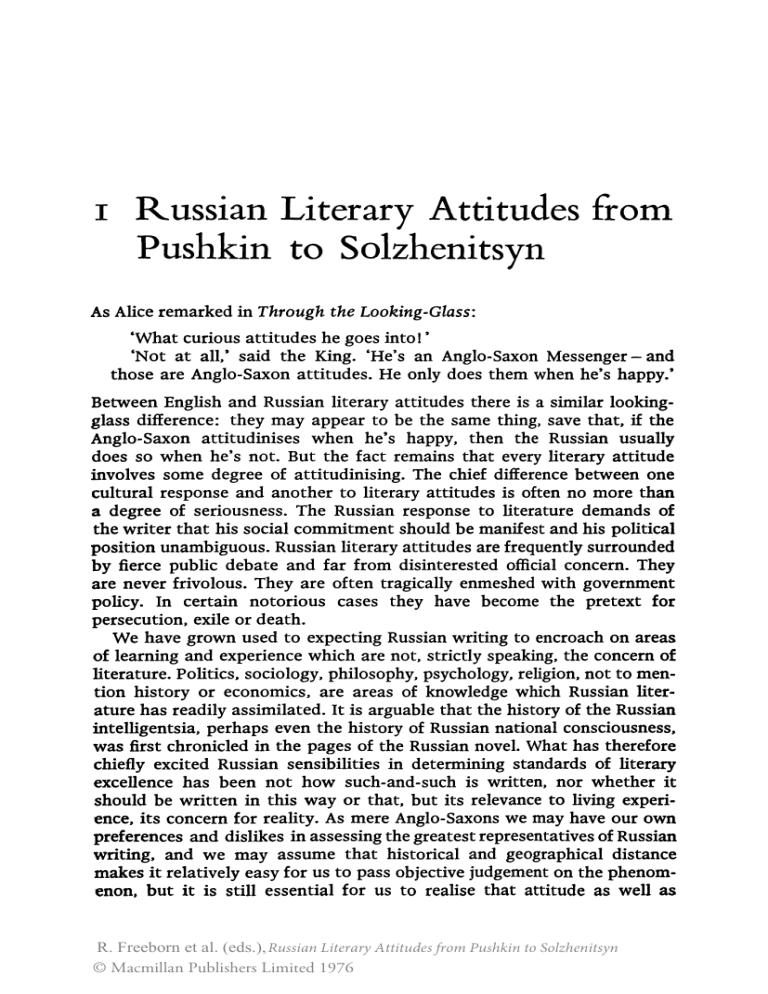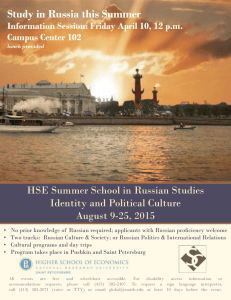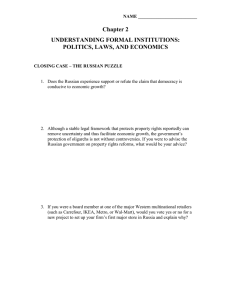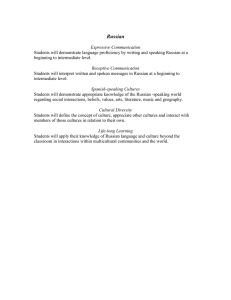Russian Literary Attitudes from Pushkin to Solzhenitsyn
advertisement

I Russian Literary Attitudes from Pushkin to Solzhenitsyn As Alice remarked in Through the Looking-Glass: 'What curious attitudes he goes into!' 'Not at all,' said the King. 'He's an Anglo-Saxon Messenger- and those are Anglo-Saxon attitudes. He only does them when he's happy.' Between English and Russian literary attitudes there is a similar lookingglass difference: they may appear to be the same thing, save that, if the Anglo-Saxon attitudinises when he's happy, then the Russian usually does so when he's not. But the fact remains that every literary attitude involves some degree of attitudinising. The chief difference between one cultural response and another to literary attitudes is often no more than a degree of seriousness. The Russian response to literature demands of the writer that his social commitment should be manifest and his political position unambiguous. Russian literary attitudes are frequently surrounded by fierce public debate and far from disinterested official concern. They are never frivolous. They are often tragically enmeshed with government policy. In certain notorious cases they have become the pretext for persecution, exile or death. We have grown used to expecting Russian writing to encroach on areas of learning and experience which are not, stricdy speaking, the concern of literature. Politics, sociology, philosophy, psychology, religion, not to mention history or economics, are areas of knowledge which Russian literature has readily assimilated. It is arguable that the history of the Russian intelligentsia, perhaps even the history of Russian national consciousness, was first chronicled in the pages of the Russian novel. What has therefore chiefly excited Russian sensibilities in determining standards of literary excellence has been not how such-and-such is written, nor whether it should be written in this way or that, but its relevance to living experience, its concern for reality. As mere Anglo-Saxons we may have our own preferences and dislikes in assessing the greatest representatives of Russian writing, and we may assume that historical and geographical distance makes it relatively easy for us to pass objective judgement on the phenomenon, but it is still essential for us to realise that attitude as well as R. Freeborn et al. (eds.), Russian Literary Attitudes from Pushkin to Solzhenitsyn © Macmillan Publishers Limited 1976 2 Russian Literary Attitudes from Pushkin to Solzhenitsyn expertise separates Dostoevsky from Gorky, say, or Pushkin from Pasternak. The attitudes are part of a history and tradition alien to us, yet by no means irrelevant to our experience in the final quarter of the twentieth century. We like to be pragmatically sure that literature is 'fiction' and in making such a distinction we may be in danger of overlooking the essential truths that literature alone can properly enshrine. Such a distinction is hardly recognised in Russian critical writing. In the Russian attitude to literature there is a tendency to assume that it, and it alone, is a repository of truth, that eternity is its birthright and the immortality of the soul its rightful subject. To Solzhenitsyn, for example, iri his Nobel speech, one of the great attributes of literature was the way in which it could transmit condensed experience from generation to generation: 'So it becomes the living memory of a nation. It sustains within itself and safeguards a nation's missing history- in a form which cannot be distorted or falsified. In this way literature together with language preserves the national soul.' Solzhenitsyn's tone, or manner of expression, in this statement may seem too bold, out of keeping perhaps with the soft, ingratiating apologetics which we are accustomed to expect from English writers when they speak about their role. Indeed, he assumes something about literature which may seem exaggerated and a trifle old-fashioned. There is no doubt at all that he believes sincerely in the truth of his view of literature, but as Anglo-Saxons, despite our own attitudes, we can hardly speak of our literature today with that degree of conviction and commitment. The tone belongs, one suspects, to another age and clime, when our literature aimed to preserve national values against the industrialism and imperialism of Victorian England. In this sense it resembles the tone of Thomas Carlyle and it has something of his attitude in it. When he delivered his lecture on 'The Hero as Poet' on 12 May 1840 and posed his fundamental query about the English view of the hero as poet, he was speaking in an idiom which would be familiar to Solzhenitsyn: Which Englishman we ever made, in this land of ours, which million of Englishmen, would we not give up rather than the Stratford Peasant? There is no regiment of highest Dignitaries that we would sell him for. He is the grandest thing we have yet done. For our honour among foreign nations, as an ornament to our English household, what item is there that we would not surrender rather than him? Consider now, if they asked us, Will you give up your Indian Empire or your Shakespeare, you English; never have had any Indian Empire, or never have had any Shakespeare? Really it were a grave question. Official persons would answer doubtless in official language; but we, for our part too, should not we be forced to answer: Indian Empire, or no Indian Empire, we cannot do without Shakespeare! Indian Empire will






